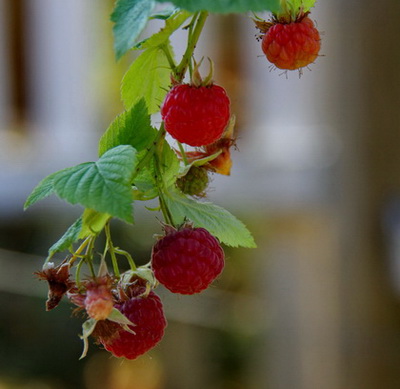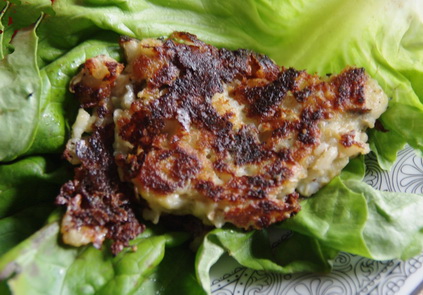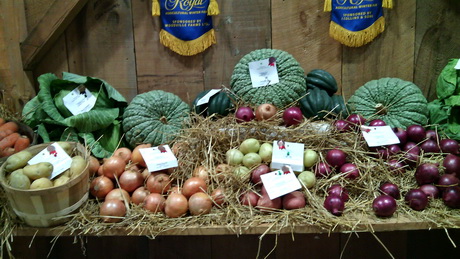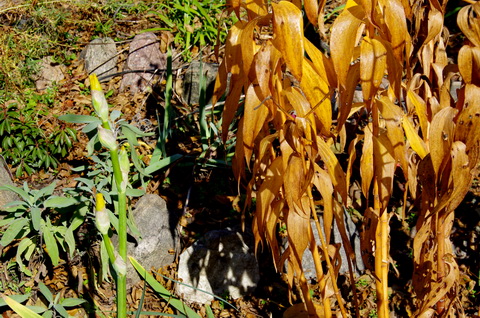| Back to Back Issues Page |
 |
|
Dallying In The Dirt, Issue #239--- November raspberries are a rare treat. November 09, 2015 |
 They were as delicious as they look. The Heritage variety of Raspberries are excellent fall producers but finding 4 ripe berries in the middle of November is just one of those rare treats that make it all worthwhile. Pruning Raspberries is a bit of a tricky business. It’s the when and which ones that are tricky. The actual pruning is just cutting the canes close to the ground and disposing of them someplace other than your compost. Those prickly canes do not break down easily and can be a nasty surprise in finished compost. The Heritage, my favourite variety, is doubly confusing as they will bear fruit in July on last year’s canes that you didn’t cut down and they will bear heavily in the fall on new growth if you cut last years canes down to the ground. I sort of do a little of both and try to get the best of both worlds.
They were as delicious as they look. The Heritage variety of Raspberries are excellent fall producers but finding 4 ripe berries in the middle of November is just one of those rare treats that make it all worthwhile. Pruning Raspberries is a bit of a tricky business. It’s the when and which ones that are tricky. The actual pruning is just cutting the canes close to the ground and disposing of them someplace other than your compost. Those prickly canes do not break down easily and can be a nasty surprise in finished compost. The Heritage, my favourite variety, is doubly confusing as they will bear fruit in July on last year’s canes that you didn’t cut down and they will bear heavily in the fall on new growth if you cut last years canes down to the ground. I sort of do a little of both and try to get the best of both worlds.  Last week was a very busy week, which is one of the reasons that Dallying is appearing on Monday. The weather was amazingly warm and that kept us outside as much as possible but time spent outside meant more time needed to be spent inside. Several things were harvested and had to be dealt with. The last huge Celery plant was dug up and brought in and become a large batch of Celery Soup It has a wonderful flavour on its own but the addition of a little 35% cream makes a cream of celery soup that is very pleasant. The big question is always how much cream is “a little?” There are those of us who think you can never have too much.
Last week was a very busy week, which is one of the reasons that Dallying is appearing on Monday. The weather was amazingly warm and that kept us outside as much as possible but time spent outside meant more time needed to be spent inside. Several things were harvested and had to be dealt with. The last huge Celery plant was dug up and brought in and become a large batch of Celery Soup It has a wonderful flavour on its own but the addition of a little 35% cream makes a cream of celery soup that is very pleasant. The big question is always how much cream is “a little?” There are those of us who think you can never have too much.There were also a large pile of Eggplants that made it into the house. Unlike many of the veggies, the Eggplant fruit are much less susceptible to frost damage than the actual plants. A large batch of the mixture to make Eggplant fritters takes a few hours to create but it is one of the best recipes and a great way to keep the eggplant harvest for use over the winter. Since it is a semi-liquid mixture and we only want a small portion for any evening’s dinner we freeze it in portion sizes by using the ice cube trays.  Wednesday was a lost gardening day in last week’s busy schedule. I spent the day in downtown Toronto judging all of the vegetable entries in the Royal Agricultural Winter Fair. My more distant readers will need to now that this is probably the biggest fair in the country and draws huge crowds of city dwellers to see what their country cousins do all year. It lasts for 10 days and features a large horse show and competitions for most farm animals as well as the large array of vegetables that I get to judge. The Assistant Gardener and I returned to visit it yesterday to wander the acres of booths selling everything remotely agricultural as well as a great selection of specialty foods. We sat for a while and watched a couple of competitions, one of which was the grand champion bull. Magnificent animals that I never want to get in a pen with. To see these huge animals with their hair all washed, brushed and blow dried is a great experience. If you live near Toronto and have
never been to the RAWF then treat yourself and visit. It’s open until next weekend.
Wednesday was a lost gardening day in last week’s busy schedule. I spent the day in downtown Toronto judging all of the vegetable entries in the Royal Agricultural Winter Fair. My more distant readers will need to now that this is probably the biggest fair in the country and draws huge crowds of city dwellers to see what their country cousins do all year. It lasts for 10 days and features a large horse show and competitions for most farm animals as well as the large array of vegetables that I get to judge. The Assistant Gardener and I returned to visit it yesterday to wander the acres of booths selling everything remotely agricultural as well as a great selection of specialty foods. We sat for a while and watched a couple of competitions, one of which was the grand champion bull. Magnificent animals that I never want to get in a pen with. To see these huge animals with their hair all washed, brushed and blow dried is a great experience. If you live near Toronto and have
never been to the RAWF then treat yourself and visit. It’s open until next weekend. Now it’s time to answer a few of my reader’s questions. Don’t forget to check the front page of the Website for frequent short ideas for current gardening activities. Lee Asks? I am wondering if I can plant spring bulbs in çontainers and winter them in the garden for spring blooming. |
| Back to Back Issues Page |
